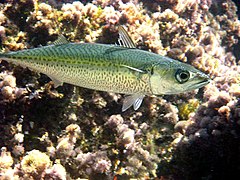Isthomosacanthidae
Appearance
(Redirected from Serrasentis sciaenus)
| Isthomosacanthidae | |
|---|---|
| Scientific classification | |
| Domain: | Eukaryota |
| Kingdom: | Animalia |
| Phylum: | Acanthocephala |
| Class: | Palaeacanthocephala |
| Order: | Polymorphida |
| Family: | Isthomosacanthidae Smales, 2012 |
Isthomosacanthidae is a family of parasitic spiny-headed (or thorny-headed) worms.[1]
Species
[edit]Isthomosacanthidae contains the following genera and species:[a]
Golvanorhynchus
[edit]Golvanorhynchus Noronha, Fabio & Pinto, 1978 contains one species.
- Golvanorhynchus golvani Noronha, Fabio & Magalhaes, 1978
G. golvani was found parasitizing the Atlantic chub mackerel (Scomber colias).[2]
Gorgorhynchoides
[edit]Gorgorhynchoides Cable and Linderoth, 1963 contains many species.
- Gorgorhynchoides bullocki Cable and Mafarachisi, 1970
- Gorgorhynchoides cablei (Gupta and Fatma, 1987)
- Gorgorhynchoides cribbi Smales, 2014
- Gorgorhynchoides elongatus Cable and Linderoth, 1963
- Gorgorhynchoides epinepheli Wang, 1986
- Gorgorhynchoides gnathanodontos Smales, 2014
- Gorgorhynchoides golvani (Chandra, Hanumantha-Rao and Shyamasundari, 1984)[3]
Found in Australia and has 14 to 16 rows of 3 large, 7 spiniform hooks on their proboscis.[3]
- Gorgorhynchoides indicus Bhattacharya and Banerjee, 2003
- Gorgorhynchoides lintoni Cable and Mafarachisi, 1970
- Gorgorhynchoides orientalis (Wang, 1966)
- Gorgorhynchoides queenslandensis Smales, 2014
- Gorgorhynchoides valiyathurae (Nadakal, John and Jacob, 1990)
Serrasentis
[edit]Serrasentis Van Cleave, 1923 contains many species.

- Serrasentis engraulisi Gupta & Gupta, 1980
- Serrasentis fotedari Gupta & Fatma, 1980
- Serrasentis gibsoni[5]
- Serrasentis golvani Gupta & Kumar, 1987
- Serrasentis lamelliger (Diesing, 1854)
- Serrasentis manazo Bilqees & Khan, 2005
- Serrasentis mujibi Bilqees, 1972
- Serrasentis nadakali George & Nadakal, 1978
- Serrasentis niger Kahatoon and Bilqees, 2007
- Serrasentis psenesi Gupta & Gupta, 1980
- Serrasentis sagittifer (Linton, 1889)
- Serrasentis sauridae Surekha and Vijayalakshmi, 2006
- Serrasentis sciaenus Bilqees, 1972
- Serrasentis sidaroszakaio Tadros, Iskandar & Wassef, 1979
Hosts
[edit]Isthomosacanthidae species parasitize fish hosts.
- Hosts for Diplosentidae species
-
Golvanorhynchus golvani was found parasitizing the Atlantic chub mackerel.
Notes
[edit]- ^ A binomial authority in parentheses indicates that the species was originally described in a genus other than the present genus.
References
[edit]- ^ Huston, D. C., Cribb, T. H., & Smales, L. R. (2020). Molecular characterisation of acanthocephalans from Australian marine teleosts: proposal of a new family, synonymy of another and transfer of taxa between orders. Systematic Parasitology, 1-23.
- ^ Pichelin, S. & Cribb, T. (2001). The status of the Diplosentidae (Acanthocephala: Palaeacanthocephala) and a new family of acanthocephalans from Australian wrasses (Pisces: Labridae). Folia Parasitologica, 48(4), 289–303.
- ^ a b Smales, L. R. (2022). A review of the Arhythmacanthidae (Acanthocephala) in Australia with the descriptions of a new genus and 6 new species. Transactions of the Royal Society of South Australia, 147(1), 69–101. https://doi.org/10.1080/03721426.2022.2141867
- ^ Fonseca, Michelle Cristie Gonçalves da, Knoff, Marcelo, Felizardo, Nilza Nunes, Torres, Eduardo José Lopes, Di Azevedo, Maria Isabel Nogueira, Gomes, Delir Corrêa, Clemente, Sérgio Carmona de São, & Iñiguez, Alena Mayo. (2019). Acanthocephalan parasites of the flounder species Paralichthys isosceles, Paralichthys patagonicus and Xystreurys rasile from Brazil. Revista Brasileira de Parasitologia Veterinária, 28(3), 346-359. Epub June 13, 2019.https://dx.doi.org/10.1590/s1984-29612019031
- ^ Martínez-Aquino, A., García-Teh, J. G., Ceccarelli, F. S., Aguirre-Macedo, M. L., & Vidal-Martínez, V. M. (2023). Integrative taxonomy of Serrasentis gibsoni n. sp.(Acanthocephala: Isthmosacanthidae) from flatfishes in the Gulf of Mexico. Journal of Helminthology, 97, e96.

